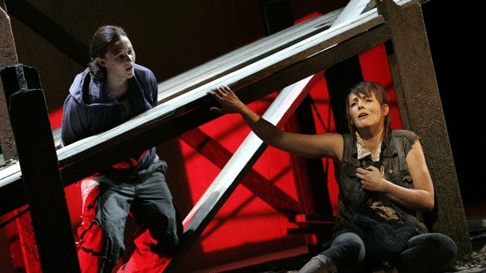James Conway’s production is beautifully sparse, using only wood and sand to create the shore upon which the characters are tested, and the cast are with him all the way, turning in performances of authentic power and directness.
The plot centres upon the perfidy of Cleopatra, who exiles her eldest son Tolomeo, condemns his wife Seleuce to slavery, and raises her younger son Alessandro to supplant him: these three are shipwrecked on an island ruled over by Araspe and his sister Elisa, who fall in love with Seleuce and Tolomeo respectively. Instead of opting for a grandiose royal sing-off, Conway goes for humanizing the characters, making the lovesick sympathetic even in their cruelty, and the shipwrecked and love-lorn intensely believable. The message seems to be that this music gives voice to the plaints of all the wretched, separated and dispossessed — and the fusion of this approach with grand Handelian arias works wonderfully well.
Clint van der Linde impressed me with his Oberon when he was a student at the RCM, so it was especially good to hear him as a fully developed artist, his singing confident and powerful once ‘Cielo ingiusto’ was out of the way. He was completely convincing as the shipwrecked king, both noble and touching in his grief for his presumed loss, and his arias were sung with the assurance and expressiveness which mark out a real Handel singer — ‘Torna sol per un momento’ was superb, every phrase finely placed and sung with sweet poignancy.
Katherine Manley bears a passing resemblance to Lorraine Hunt Lieberson, and her singing is of almost equal intensity — she was a very credible and sympathetic Seleuce, her acting as committed as her singing was pure in tone, and ‘Fonti amiche, aure leggere’ could hardly have been more eloquently sung.
Rachel Nicholls was an articulate and richly-toned Elisa, James Laing a sweet-voiced Alessandro, and Neil Baker an exceptionally strong Araspe — the last is a complex character, not the usual blustering villain, so it made sense to have a somewhat lighter voice than the usual Handelian basso in this part.
 Scene from Tolomeo
Scene from Tolomeo
The orchestra — especially the wind sections — played with delicacy and verve under the supportive direction of John Andrews, and the production as a whole left you wondering why this beautiful music is not more often heard. If you live near Malvern, Exeter or Cambridge, you will be able to catch it on October 29th, November 5th and November 19th respectively — most highly recommended.
Melanie Eskenazi

